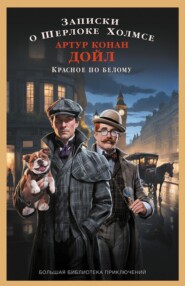По всем вопросам обращайтесь на: info@litportal.ru
(©) 2003-2025.
✖
The Sherlock Holmes Collection: The Adventures of Sherlock Holmes; The Hound of the Baskervilles; The Return of Sherlock Holmes
Автор
Год написания книги
2019
Настройки чтения
Размер шрифта
Высота строк
Поля
“Ah, and what did you gather from this allusion to a band—a speckled band?”
“Sometimes I have thought that it was merely the wild talk of delirium, sometimes that it may have referred to some band of people, perhaps to these very gypsies in the plantation. I do not know whether the spotted handkerchiefs which so many of them wear over their heads might have suggested the strange adjective which she used.”
Holmes shook his head like a man who is far from being satisfied.
“These are very deep waters,” said he; “pray go on with your narrative.”
“Two years have passed since then, and my life has been until lately lonelier than ever. A month ago, however, a dear friend, whom I have known for many years, has done me the honour to ask my hand in marriage. His name is Armitage—Percy Armitage—the second son of Mr Armitage, of Crane Water, near Reading. My stepfather has offered no opposition to the match, and we are to be married in the course of the spring. Two days ago some repairs were started in the west wing of the building, and my bedroom wall has been pierced, so that I have had to move into the chamber in which my sister died, and to sleep in the very bed in which she slept. Imagine, then, my thrill of terror when last night, as I lay awake, thinking over her terrible fate, I suddenly heard in the silence of the night the low whistle which had been the herald of her own death. I sprang up and lit the lamp, but nothing was to be seen in the room. I was too shaken to go to bed again, however, so I dressed, and as soon as it was daylight I slipped down, got a dogcart at the Crown Inn, which is opposite, and drove to Leatherhead, from whence I have come on this morning with the one object of seeing you and asking your advice.”
“You have done wisely,” said my friend. “But have you told me all?”
“Yes, all.”
“Miss Roylott, you have not. You are screening your stepfather.”
“Why, what do you mean?”
For answer Holmes pushed back the frill of black lace which fringed the hand that lay upon our visitor’s knee. Five little livid spots, the marks of four fingers and a thumb, were printed upon the white wrist.
“You have been cruelly used,” said Holmes.
The lady coloured deeply and covered over her injured wrist. “He is a hard man,” she said, “and perhaps he hardly knows his own strength.”
There was a long silence, during which Holmes leaned his chin upon his hands and stared into the crackling fire.
“This is a very deep business,” he said at last. “There are a thousand details which I should desire to know before I decide upon our course of action. Yet we have not a moment to lose. If we were to come to Stoke Moran today, would it be possible for us to see over these rooms without the knowledge of your stepfather?”
“As it happens, he spoke of coming into town today upon some most important business. It is probable that he will be away all day, and that there would be nothing to disturb you. We have a housekeeper now, but she is old and foolish, and I could easily get her out of the way.”
“Excellent. You are not averse to this trip, Watson?”
“By no means.”
“Then we shall both come. What are you going to do yourself?”
“I have one or two things which I would wish to do now that I am in town. But I shall return by the twelve o’clock train, so as to be there in time for your coming.”
“And you may expect us early in the afternoon. I have myself some small business matters to attend to. Will you not wait and breakfast?”
“No, I must go. My heart is lightened already since I have confided my trouble to you. I shall look forward to seeing you again this afternoon.” She dropped her thick black veil over her face and glided from the room.
“And what do you think of it all, Watson?” asked Sherlock Holmes, leaning back in his chair.
“It seems to me to be a most dark and sinister business.”
“Dark enough and sinister enough.”
“Yet if the lady is correct in saying that the flooring and walls are sound, and that the door, window, and chimney are impassable, then her sister must have been undoubtedly alone when she met her mysterious end.”
“What becomes, then, of these nocturnal whistles, and what of the very peculiar words of the dying woman?”
“I cannot think.”
“When you combine the ideas of whistles at night, the presence of a band of gypsies who are on intimate terms with this old doctor, the fact that we have every reason to believe that the doctor has an interest in preventing his stepdaughter’s marriage, the dying allusion to a band, and, finally, the fact that Miss Helen Stoner heard a metallic clang, which might have been caused by one of those metal bars that secured the shutters falling back into its place, I think that there is good ground to think that the mystery may be cleared along those lines.”
“But what, then, did the gypsies do?”
“I cannot imagine.”
“I see many objections to any such theory.”
“And so do I. It is precisely for that reason that we are going to Stoke Moran this day. I want to see whether the objections are fatal, or if they may be explained away. But what in the name of the devil!”
The ejaculation had been drawn from my companion by the fact that our door had been suddenly dashed open, and that a huge man had framed himself in the aperture. His costume was a peculiar mixture of the professional and of the agricultural, having a black top hat, a long frock coat, and a pair of high gaiters, with a hunting crop swinging in his hand. So tall was he that his hat actually brushed the cross bar of the doorway, and his breadth seemed to span it across from side to side. A large face, seared with a thousand wrinkles, burned yellow with the sun, and marked with every evil passion, was turned from one to the other of us, while his deep-set, bile-shot eyes, and his high, thin, fleshless nose, gave him somewhat the resemblance to a fierce old bird of prey.
“Which of you is Holmes?” asked this apparition.
“My name, sir; but you have the advantage of me,” said my companion quietly.
“I am Dr Grimesby Roylott, of Stoke Moran.”
“Indeed, Doctor,” said Holmes blandly. “Pray take a seat.”
“I will do nothing of the kind. My stepdaughter has been here. I have traced her. What has she been saying to you?”
“It is a little cold for the time of the year,” said Holmes.
“What has she been saying to you?” screamed the old man furiously.
“But I have heard that the crocuses promise well,” continued my companion imperturbably.
“Ha! You put me off, do you?” said our new visitor, taking a step forward and shaking his hunting crop. “I know you, you scoundrel! I have heard of you before. You are Holmes, the meddler.”
My friend smiled.
“Holmes, the busybody!”
His smile broadened.
“Holmes, the Scotland Yard Jack-in-office!”
Holmes chuckled heartily. “Your conversation is most entertaining,” said he. “When you go out close the door, for there is a decided draught.”
“I will go when I have said my say. Don’t you dare to meddle with my affairs. I know that Miss Stoner has been here. I traced her! I am a dangerous man to fall foul of! See here.” He stepped swiftly forward, seized the poker, and bent it into a curve with his huge brown hands.
“See that you keep yourself out of my grip,” he snarled, and hurling the twisted poker into the fireplace he strode out of the room.
“He seems a very amiable person,” said Holmes, laughing. “I am not quite so bulky, but if he had remained I might have shown him that my grip was not much more feeble than his own.” As he spoke he picked up the steel poker and, with a sudden effort, straightened it out.

















